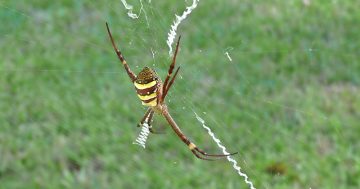 A multi-Agency expedition into the Australian Alps has uncovered three new spider species previously unknown to science.
A multi-Agency expedition into the Australian Alps has uncovered three new spider species previously unknown to science.
Celebrating the finds, Parks Australia said a warrior huntsman with a shield on its chest, a tiny 3mm jumping spider that “looks like a liquorice-all-sort” and a wraparound spider that impersonates a tree branch were discovered as part of the Australian Alps Bush Blitz species discovery expedition.
“The Alps Bush Blitz is the program’s 47th expedition and is focused on the Pilot Wilderness area in the NSW alpine region and the Cobberas Range in Victoria,” Parks Australia said.
“The Alps Bush Blitz expedition boasts 15 scientists including botanists and zoologists from Parks Australia’s National Seed Bank in Canberra, the Australian Museum, Museums Victoria, the National Herbaria of NSW and Victoria and the University of New South Wales.”
Arachnologist at the Museums Victoria Research Institute, Joseph Schubert said the Australian Alps was an incredible place for an expedition.
“Most people associate spiders with the outback dunny door, but spiders are hugely diverse,” Mr Schubert, who discovered the new spiders, said.
“From the infamous shield huntsman with war paint on his legs and a shield on his chest to frighten off predators, to tiny the jumping spiders that look like eight-eyed puppies,” he said.
“Spiders are also experts at camouflage.
“The wraparound spider is a ferocious nocturnal mini-hunter that impersonates a tree branch during the day to hide from predators.”
Parks Australia said five science teachers were also on the expedition, selected to participate in the Bush Blitz Teach Live program.
It said the program gave teachers an opportunity to work as field assistants during expeditions and allowed them to bring the expedition directly into the classroom in real time via a dedicated website.
“Since Bush Blitz’s inception in 2010 it has discovered over 1,850 new plant and animal species including frogs, reptiles, fish, spiders and insects,” the Agency said.





